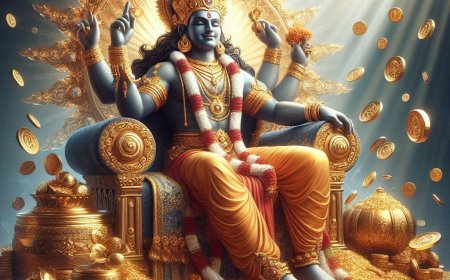Mpu Kanwa: Manifesting Arjunawiwaha from the Scratches of the Soul
Mpu Kanwa and Arjunawiwaha tell of Arjuna seeking spiritual power to defeat the giant Niwatakawaca. Mpu Kanwa emphasizes that true victory is self-mastery and wisdom. This work was presented to King Airlangga as a symbol of spiritual teachings.

Mpu Kanwa, the great poet who lived under the patronage of King Airlangga, was a man known not only for his literary abilities but also for his profound spiritual views. One quiet night, Mpu Kanwa was pensive in front of a scroll of palm paper. He knew that his upcoming work had to be more than just a story, but a work that would inspire the King and his people.
He recalled how King Airlangga had asked him to write a story that could serve as an example and inspiration for the entire kingdom, especially during the recovery period after the Great War. “How can I write a story that brings together heroism and wisdom?” he thought as he gazed out the window, watching the quiet shadows of the night.
Illustration of Mpu Kanwa starting to write Arjunawiwaha (Source: Personal Collection)
That night, after much contemplation, he decided that Arjuna, a warrior from the epic Mahabharata, was the right person to tell. “*Arjuna is not just a warrior. He is a symbol of a human being who fights against his fears and doubts. Arjuna's journey is the journey of every soul seeking enlightenment.” Mpu Kanwa began to write, and sentence after sentence began to flow from his mind.
The story of Arjunawiwaha begins with Arjuna ascending the peak of Mount Indrakila, seeking spiritual enlightenment and divine power to confront the enemy that threatens the world of the gods, the giant Niwatakawaca. In his mind, Mpu Kanwa envisioned Arjuna as a man full of doubts, yet steadfast on his path. “*His asceticism was Arjuna's greatest test. He must first fight the weakness within himself*,” Mpu Kanwa thought.
Arjuna meditated patiently, and finally Lord Indra appeared before him. Indra gives him magic weapons as a reward for Arjuna's perseverance. For Mpu Kanwa, this scene was not just about the gift of physical weapons, but a symbol of the inner strength gained through surrender and wisdom. “The greatest power comes from within,” muttered Mpu Kanwa as he wrote.
However, before Arjuna could face Niwatakawaca, he had to pass another test. The gods sent Arjuna to kahyangan, the world of the gods, where he was tested by the gods and goddesses. Arjuna had to learn that true victory is not about defeating an external enemy, but controlling oneself. Mpu Kanwa pondered this concept deeply when writing the scene.
In heaven, Arjuna met Supraba, an angel sent by the gods to help Arjuna. Mpu Kanwa describes Supraba as intelligent and full of charm. She is the key to Arjuna's victory, not only with her beauty, but with her intelligence. “A hero cannot win alone. He needs the wisdom of others,” wrote Mpu Kanwa meaningfully.
Illustration of Arjuna fighting Supraba (Source: Personal Collection)
Supraba managed to charm Niwatakawaca and caught the giant off guard. This allowed Arjuna to strike with his magic weapon and defeat the giant. In this epic battle, Mpu Kanwa realized that Arjuna's victory was symbolic of man's victory against ego and fear. “Niwatakawaca is not just an external enemy, he is an inner enemy that Arjuna must defeat,” mused Mpu Kanwa.
After Niwatakawaca was defeated, Arjuna was greeted with joy in heaven. The gods praised Arjuna, not just for his physical strength, but for his fortitude and wisdom. Mpu Kanwa paused from writing, absorbing the feeling of victory that was not only physical, but also spiritual.
After finishing that section, Mpu Kanwa thought about how he wanted to close the story. He wanted readers to understand that Arjuna's story is not just about battle, but about a journey of self-discovery. Mpu Kanwa wrote that Arjuna's greatest victory was his self-control and the understanding that true power lies in a calm and courageous soul.
Day after day, Mpu Kanwa continued to write. He added small details, enriched dialog, and built characters with great care. Each scene was written with deep meaning, reflecting the spiritual teachings he hoped readers would pick up in the future.
Finally, after weeks of relentless writing, the Arjunawiwaha was completed. Mpu Kanwa gazed at his final manuscript, satisfied yet humbled. “This is more than just a story. It is a spiritual legacy that must be read and understood by many generations,” he said with a faint smile.
Illustration of Mpu Kanwa handing over Arjunawiwaha to King Airlangga (Source: Personal Collection)
He brought his work to King Airlangga. The King, who had great respect for Mpu Kanwa, accepted the manuscript with great appreciation. He knew that this was not just a story, but a life lesson that would inspire the entire kingdom.
After leaving the palace, Mpu Kanwa walked slowly along the path, taking in the fresh air and the beauty of the surrounding nature. In his heart, he felt that his duty was done, but his spiritual journey as a poet would never end. “Life is a journey full of lessons, and every story is part of our search for meaning,” he murmured softly.
Later on, the Arjunawiwaha became a widely recognized work and was studied by many. Mpu Kanwa is remembered as a great poet who not only wrote to entertain, but to teach and inspire. Through his works, he shared the timeless wisdom that in every battle, whether with the outside world or within, there is a lesson to be learned.






























































